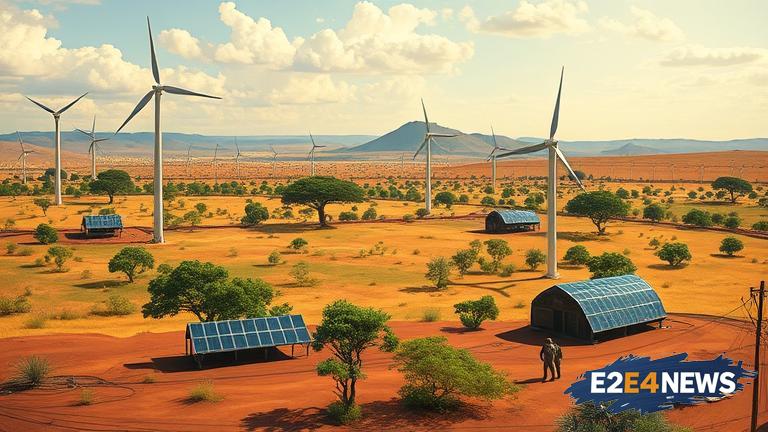The African continent is witnessing a significant shift towards renewable energy, driven by the need to address the pressing issues of energy access, energy security, and climate change. With a growing population and increasing economic activities, the demand for energy is on the rise, and renewable energy is emerging as a viable solution. Solar and wind power are the most prominent forms of renewable energy in Africa, with countries like South Africa, Egypt, and Morocco leading the way. The cost of renewable energy is decreasing, making it more competitive with fossil fuels, and governments are implementing policies to support the development of renewable energy projects. The African Union’s Agenda 2063 and the United Nations’ Sustainable Development Goals (SDGs) are also driving the adoption of renewable energy in Africa. The benefits of renewable energy are numerous, including reduced greenhouse gas emissions, improved air quality, and enhanced energy security. Moreover, renewable energy can create jobs, stimulate local economies, and contribute to poverty reduction. However, the transition to renewable energy also poses challenges, such as the need for significant investment, infrastructure development, and technology transfer. To address these challenges, international cooperation and partnerships are essential, and organizations like the International Renewable Energy Agency (IRENA) are playing a crucial role in supporting the development of renewable energy in Africa. The private sector is also investing heavily in renewable energy projects, and companies like Vestas, Siemens Gamesa, and Goldwind are leading the charge. In addition, innovative financing models, such as green bonds and crowdfunding, are emerging to support the development of renewable energy projects. The impact of renewable energy on the environment is significant, as it reduces the reliance on fossil fuels and decreases greenhouse gas emissions. Furthermore, renewable energy can improve energy access, particularly in rural areas, where traditional energy sources are often scarce. The social benefits of renewable energy are also substantial, as it can create jobs, improve health outcomes, and enhance overall well-being. In conclusion, the renewable energy revolution in Africa is gaining momentum, driven by the need to address energy access, energy security, and climate change. With the right policies, investments, and partnerships, Africa can transition to a low-carbon economy, improve the lives of its citizens, and contribute to a sustainable future. The future of renewable energy in Africa looks promising, with new technologies, innovative financing models, and international cooperation emerging to support the development of renewable energy projects. As the continent continues to grow and develop, the importance of renewable energy will only continue to increase, and it is essential that governments, private sector companies, and civil society organizations work together to support the transition to a low-carbon economy. The time to act is now, and the benefits of renewable energy are clear, making it an essential component of Africa’s energy mix. With the correct approach, Africa can become a leader in the global renewable energy market, and the continent’s renewable energy revolution can serve as a model for other regions to follow. The potential for renewable energy in Africa is vast, and it is essential that all stakeholders work together to realize this potential and create a sustainable future for the continent. Renewable energy can play a critical role in achieving the SDGs, particularly SDG 7, which aims to ensure access to affordable, reliable, sustainable, and modern energy for all. By transitioning to renewable energy, Africa can reduce its reliance on fossil fuels, decrease greenhouse gas emissions, and improve energy access, thereby contributing to a more sustainable future. The renewable energy sector in Africa is expected to continue growing, driven by declining costs, improving technologies, and increasing demand for clean energy. As the sector continues to evolve, it is essential that governments, private sector companies, and civil society organizations work together to address the challenges and opportunities that arise. The development of renewable energy in Africa requires a coordinated approach, involving all stakeholders, to ensure that the benefits of renewable energy are realized and the challenges are addressed. In the coming years, Africa is expected to become a major player in the global renewable energy market, and the continent’s renewable energy revolution will have a significant impact on the environment, the economy, and society as a whole.
